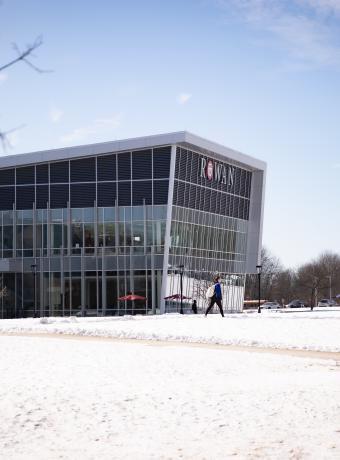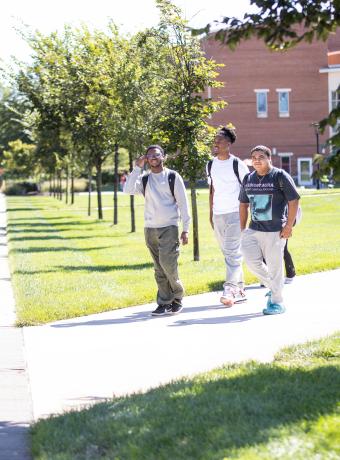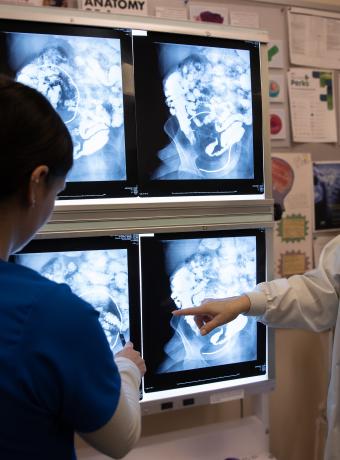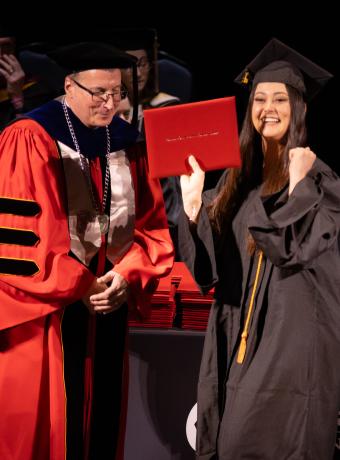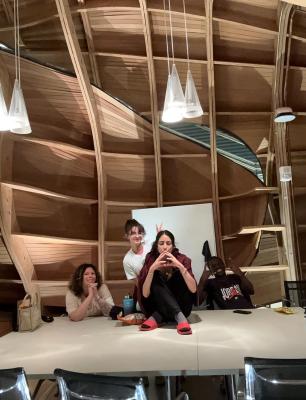
“If you could do anything you wanted, what would you do?”
Princeton University Director of Transfer and Outreach Dr. Keith Shaw posed this question to Rowan College at Burlington County student Carrie Curry. She mulled it over. She wanted to foray into advanced research of behavioral neuroscience; the mother of two children on the autism spectrum, she had a particular interest in the hows and whys of the neurodevelopmental disorder. However, with experience as a peer support specialist and being in her 40s, entering social work made more sense—and seemed easier.
Shaw was meeting with Curry about Princeton’s Transfer Scholars Initiative, a program for community college students interested in transferring to a four-year college to experience life at the Ivy League institution. Underscoring Princeton’s renowned neuroscience program, Shaw stressed to her: “Don’t think about the clock. Stop the clock."
At that moment, “the director changed my direction,” Curry said. She finally had her answer.
Curry and a cohort of other Barons and community college students from New Jersey were full-time Princeton Tigers for eight weeks. She lived just like a Princeton undergraduate would - housed right on the sprawling campus in central NJ at the Emma Bloomberg Center for Access and Opportunity. Every day she walked between the iconic gothic building for classes and engaged with other Princeton faculty, students, and summer programs. Perhaps unlike a Princeton undergrad, she even met with the dean of Princeton and other major universities.
“The entire experience was incredible,” Curry said.
During her two full-time courses - which were for credit and at no cost - Curry gained valuable experience by participating hands-on in Princeton’s state-of-the-art science labs. She parsed multiple disciplines like chemistry, physics, and biology through numerous experiments.
“I dissected a lamb’s brain,” Curry recounted. “I had to create action potentials in numerous ways, one of which was we took earthworms and put them in chloroform, then we had to connect electrodes to them and then slowly turn up the voltage to create the action potential through the nervous system… While I was doing this, I was collecting data.”
Writing was also heavily incorporated into the coursework. With the help of Princeton lecturers, Curry learned to take an argumentative approach in her writing assignments, including one that tasked her with expanding Albert Einstein’s letter to President Franklin Roosevelt about the advancements of the atomic bomb into a full-fledged essay.
These classes were small, but Curry liked it that way. She notes the deep connection the participants were able to make with the people around them, even if they were dissimilar to the eye.
“We got to meet a lot of really incredible people and hear their stories,” Curry said. “There’s so much diversity, it’s actually really incredible. There are people who have different types of disabilities... There are people from every background imaginable, people in the LGBTQ community. There’s no judgment. We all have each other’s backs, and it’s about seeing where each of us ends up.”
The program concluded in mid-August. After everyone packs up for home and charts their next step, the hope is to open the eyes of every student and instill in them that community college students can transfer to highly selective universities like those in the Ivy League.
“Most people think it’s impossible to transfer from here to Princeton, but it’s absolutely not,” Curry said. “With me, the staff had said to me, ‘Apply here for graduate school.’”
As a 3+1 student, Curry will finish her junior courses at RCBC this year and attend her senior year at Rowan University. But thanks to the Transfer Scholars Initiative, when undergrad is said and done, she has a litany of paths sparked from one dream to pursue.
“I’m not going to just stop at a bachelor’s degree; I’m going to keep going,” Curry said. “And knowing that door is still open is a great feeling.”

